Did you know that approximately 10% of Poodles suffer from food allergies or sensitivities? Understanding what triggers these reactions in your furry companion is vital for their overall health. By uncovering the signs and root causes of these allergies, you can ensure a happier and healthier life for your Poodle. Keep on reading to discover practical tips and strategies to help you navigate the world of Poodle food allergies and sensitivities.
Key Takeaways
- Common triggers include beef, poultry, dairy, and additives.
- Accurate diagnosis through elimination diets is crucial.
- Dietary adjustments like hypoallergenic diets help manage sensitivities.
- Symptom relief with medications and prevention through allergen identification.
Common Food Allergies in Poodles

Common food allergies in Poodles encompass a range of potential triggers, including beef, poultry, lamb, fish, dairy, soy, wheat, corn, and various additives. When Poodles are allergic to these common food allergens, they may exhibit various symptoms. These symptoms can manifest as vomiting, diarrhea, itchy or irritated skin, lethargy, hyperactivity, and even aggression. Skin allergies are particularly common in Poodles with food sensitivities, often leading to rashes and constant scratching. It is essential to note that genetic inheritance also plays a significant role in the development of food allergies in Poodles. Therefore, if a Poodle has a parent with food allergies, they are more likely to inherit this trait. Understanding the common food allergens and symptoms associated with food allergies in Poodles is crucial for pet owners to provide appropriate care and dietary adjustments to ensure the well-being of their furry companions.
Signs of Food Sensitivities in Poodles

When assessing signs of food sensitivities in Poodles, common symptoms include vomiting, diarrhea, and gas. Poodles with food sensitivities may also display tenderness or pain in the abdominal area. Look out for intermittent vomiting and regurgitation of uneaten food, which can be indicators of food sensitivities in Poodles.
Common Allergy Symptoms
Experiencing a range of symptoms such as vomiting, diarrhea, itchy skin, lethargy, and hyperactivity can indicate potential food sensitivities in Poodles. These signs may be a reaction to specific ingredients in their diet, requiring a careful evaluation and potentially switching to hypoallergenic food. Addressing such issues promptly is crucial, as food sensitivities can sometimes contribute to or exacerbate other common poodle health problems, such as gastrointestinal distress or skin allergies. Consulting a veterinarian can help identify triggers and create a tailored plan to ensure your Poodle’s overall health and well-being.
- Persistent Scratching: Poodles may excessively scratch their skin due to irritation.
- Recurrent Ear Infections: Chronic ear infections could signal an underlying food allergy.
- Lethargy and Fatigue: A lack of energy and enthusiasm could be linked to food sensitivities.
- Unexplained Weight Loss: Sudden weight loss without a change in diet might be a symptom of a food allergy.
These symptoms, ranging from skin irritations to changes in behavior, serve as crucial indicators of potential food sensitivities in your Poodle. Be observant and seek veterinary advice if you notice these signs.
Digestive Issues in Poodles
If your Poodle is displaying signs of digestive issues such as tender or painful abdomens, intermittent vomiting, and regurgitation of uneaten food, these could indicate potential food sensitivities that require attention. Digestive problems in Poodles, like flatulence and tender abdomens, may suggest food sensitivities. Look out for specific symptoms such as regurgitation, intermittent vomiting, and flatulence, as these could be linked to intolerances to certain foods. Monitoring your Poodle for signs like regurgitation of uneaten food and tender abdomens can aid in identifying food sensitivities. Intolerance to certain foods may manifest as symptoms including vomiting, gas, and painful abdomens in Poodles. If these signs persist, consulting a veterinarian for further evaluation and dietary recommendations is crucial for your Poodle's well-being.
Skin Reactions to Food
Skin reactions to food in Poodles can manifest as redness, itching, hives, and hot spots, indicating potential food sensitivities that require attention.
- Redness and inflammation: Poodles may exhibit skin redness in response to food sensitivities.
- Persistent itching: Constant scratching due to food sensitivities can lead to skin irritation.
- Development of hives: Allergic reactions to food may result in the formation of hives on a Poodle's skin.
- Hot spots: Food sensitivities can cause Poodles to develop painful and inflamed hot spots on their skin.
These signs of skin reactions in Poodles highlight the importance of recognizing and addressing food sensitivities promptly to ensure the well-being of your furry companion. These adverse reactions can manifest in various ways, such as constant itching, redness, or even gastrointestinal discomfort, making it vital to monitor their health closely. Understanding typical Poodle behavior, such as their naturally active and lively demeanor, can help pet owners identify when something seems off, as changes in energy levels or mood may also signal an underlying issue. By consulting with a veterinarian and tailoring their diet to suit their specific needs, you can help your Poodle live a happy and itch-free life.
Understanding Poodle Food Intolerances
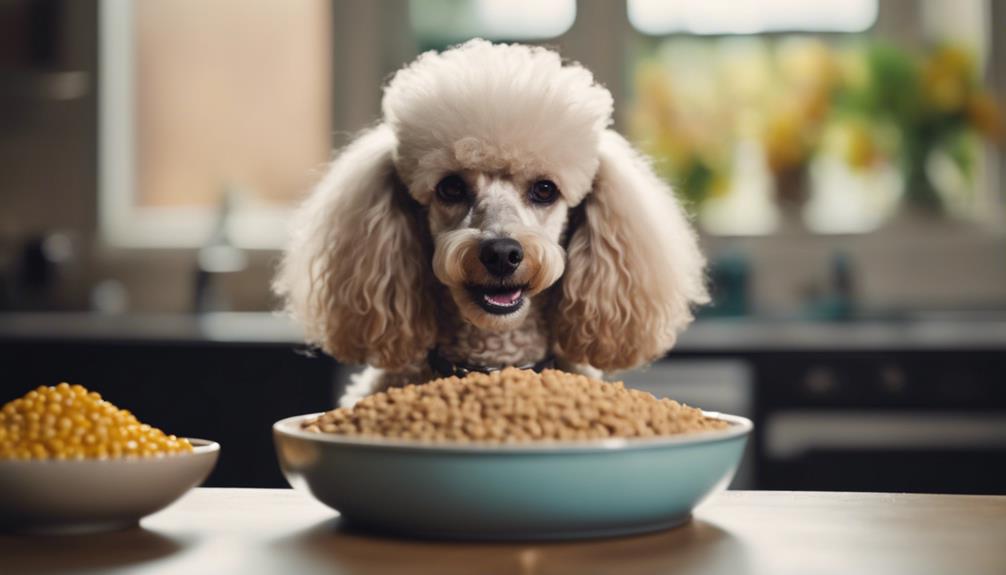
When it comes to understanding Poodle food intolerances, it is crucial to consider the intricate workings of their digestive system. Common food triggers such as gluten or lactose can often lead to gastrointestinal distress in Poodles with intolerances. Effectively managing food intolerances in Poodles involves identifying and eliminating these trigger ingredients from their diets to promote better digestive health.
Poodle Digestive System
Understanding the intricate workings of the Poodle digestive system is essential in managing and addressing food intolerances effectively. Here are some key points to keep in mind: The Poodle’s digestive system is uniquely sensitive, requiring careful selection of high-quality, easily digestible food to prevent gastrointestinal discomfort. Certain ingredients, such as artificial additives or common allergens like wheat and soy, should be avoided to minimize potential reactions. Incorporating tailored poodle diet and nutrition tips can help ensure your furry companion maintains optimal health and enjoys a balanced, nourishing diet. Additionally, introducing probiotics and prebiotics into their diet can support a healthy gut microbiome, further enhancing their digestive well-being. For a more controlled approach to nutrition, many owners turn to homemade poodle diet recipes, which allow for the customization of meals to suit individual dietary needs and preferences. By prioritizing wholesome, natural ingredients, you can help your Poodle thrive while reducing the risk of digestive issues. Moreover, it’s important to address common myths when planning your pet’s meals, as misinformation can lead to unintentional harm. Poodle nutrition misconceptions explained by experts often highlight the risks of over-relying on grain-free diets or overlooking the importance of portion control. By staying informed and consulting with a veterinarian, you can provide your Poodle with the best possible care and support their overall well-being.
- Poodles have sensitive digestive systems that can be prone to food intolerances.
- Food intolerances in Poodles may manifest as gastrointestinal issues like vomiting and diarrhea.
- Symptoms of food intolerances in Poodles can include flatulence and abdominal discomfort.
- Properly identifying and managing food intolerances can significantly enhance the overall health and well-being of your Poodle.
Common Food Triggers
To effectively manage and address food intolerances in Poodles, it is crucial to identify common food triggers that can lead to adverse reactions in their sensitive digestive systems. Common food triggers for Poodle food allergies and sensitivities include beef, poultry, lamb, fish, dairy, soy, wheat, corn, and additives. Poodles can develop intolerances to proteins like beef, chicken, and dairy products, manifesting symptoms such as vomiting, diarrhea, gas, chronic ear infections, and skin problems. Identifying specific triggers is essential for effectively managing Poodle food allergies and sensitivities. These triggers can cause severe reactions, underscoring the importance of understanding and addressing your Poodle's food sensitivities and allergies promptly.
| Food Triggers | Examples |
|---|---|
| Proteins | Beef, poultry, lamb, fish, dairy |
| Grains | Wheat, corn |
| Legumes | Soy |
| Additives | Preservatives, coloring agents |
Managing Food Intolerances
Managing Poodle food intolerances involves precisely identifying and eliminating problematic ingredients from their diet to alleviate gastrointestinal issues. When dealing with food intolerances in Poodles, it is crucial to:
- Consult a vet to determine the best approach for conducting elimination trials.
- Gradually transition the Poodle to a new diet to prevent further digestive disturbances.
- Keep a detailed food journal to track any adverse reactions and pinpoint the source of intolerance.
- Consider specialized diets formulated for dogs with food sensitivities to ensure balanced nutrition while avoiding trigger ingredients.
Managing Poodle Food Allergies

Addressing Poodle food allergies necessitates a multifaceted approach involving medical treatments, dietary modifications, and environmental management strategies. Poodles experiencing allergic reactions to food may benefit from medicated baths to soothe skin irritation. Additionally, medications like antihistamines, antibiotics, and antifungal drugs can help alleviate symptoms of food allergies in Poodles. Implementing flea control measures is crucial for managing flea allergies that may exacerbate overall allergic responses in Poodles. Dietary changes, including specialized diets and supplements, play a vital role in reducing allergic reactions in Poodles with food sensitivities. Furthermore, environmental control methods such as minimizing exposure to allergens like pollen and dust mites are essential for managing environmental allergies in Poodles. By combining these medical, dietary, and environmental strategies, you can effectively manage food allergies in your Poodle and improve their quality of life.
Testing for Food Allergies in Poodles
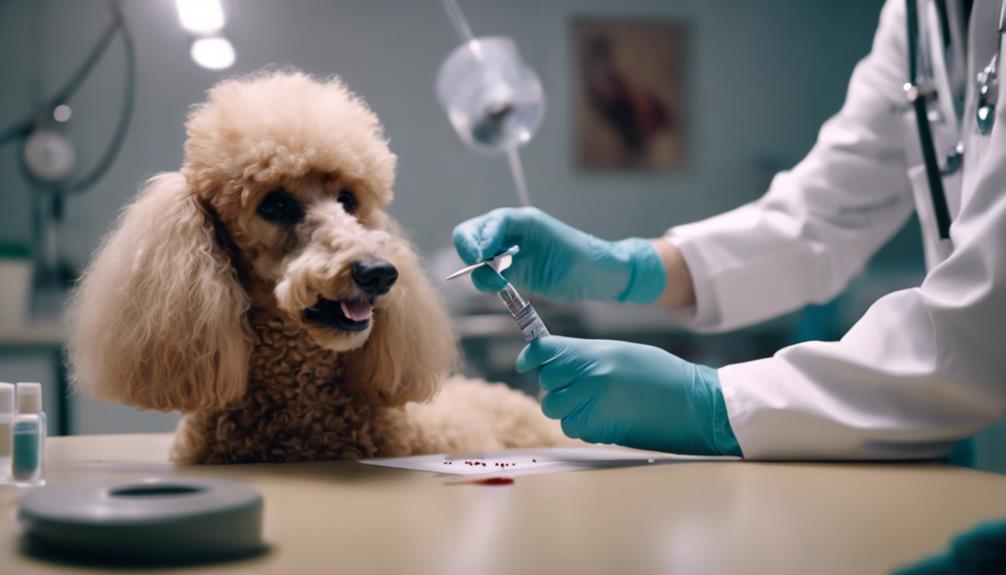
When testing for food allergies in Poodles, it is essential to understand the limitations of blood and saliva tests. Vets rely on elimination trial diets to accurately diagnose food allergies in Poodles, following strict prescription diets for 2 to 3 months. Reintroducing allergens gradually after the elimination trial period aids in pinpointing specific food allergens, emphasizing the importance of consulting with a vet for precise testing and diagnosis.
Allergy Testing Methods
To accurately diagnose food allergies in Poodles, veterinarians primarily rely on elimination trial diets rather than blood or saliva tests. When testing for food allergies in Poodles, it's crucial to consider the following:
- Elimination trial diets are the gold standard for diagnosing food allergies in Poodles.
- Prescription diets must be strictly adhered to during the elimination trial period.
- The elimination trial typically lasts 2 to 3 months to accurately identify food allergens.
- Vets may recommend changes in diet, toothpaste, and medication to pinpoint specific allergens in Poodles.
Interpretation of Results
For accurate diagnosis of food allergies in Poodles, interpreting the results of elimination trial diets is crucial. During the elimination trial period, Poodles are fed prescription diets to rule out specific allergens. It is essential to strictly adhere to the prescribed diet for 2 to 3 months to ensure accurate results. Veterinarians may also recommend changes in toothpaste, medication, or other environmental factors to pinpoint the exact allergen affecting your Poodle. By closely monitoring your Poodle's response to the elimination diet, you can effectively identify and manage food allergies, leading to a happier and healthier life for your canine companion.
| Factors to Consider | Importance | Recommendations |
|---|---|---|
| Strict Diet Adherence | Crucial for Accuracy | Follow Prescribed Diet |
| Duration of Trial | 2-3 Months for Results | Patience is Key |
| Monitoring Response | Observing Changes | Note Any Improvements |
| Vet Recommendations | Expert Guidance | Trust Professional Advice |
Dietary Adjustments for Poodle Sensitivities

Consider eliminating common allergens like beef, poultry, lamb, fish, and dairy products from the diet of Poodles with sensitivities to pinpoint triggers and improve their overall wellness. By making these dietary adjustments, you can help manage your Poodle's food allergies effectively. Here are some key points to guide you in adjusting your Poodle's diet:
- Switch to a hypoallergenic diet to identify and manage food sensitivities.
- Conduct an elimination diet to determine specific allergens triggering sensitivities.
- Gradually reintroduce ingredients post-elimination diet to pinpoint the exact triggers.
- Consult a vet for personalized guidance on the best dietary adjustments for your Poodle's sensitivities.
These adjustments are crucial in alleviating your Poodle's discomfort and enhancing their quality of life. Remember, a carefully tailored diet can make a significant difference in managing food allergies in your beloved Poodle.
Allergy-Friendly Poodle Food Options
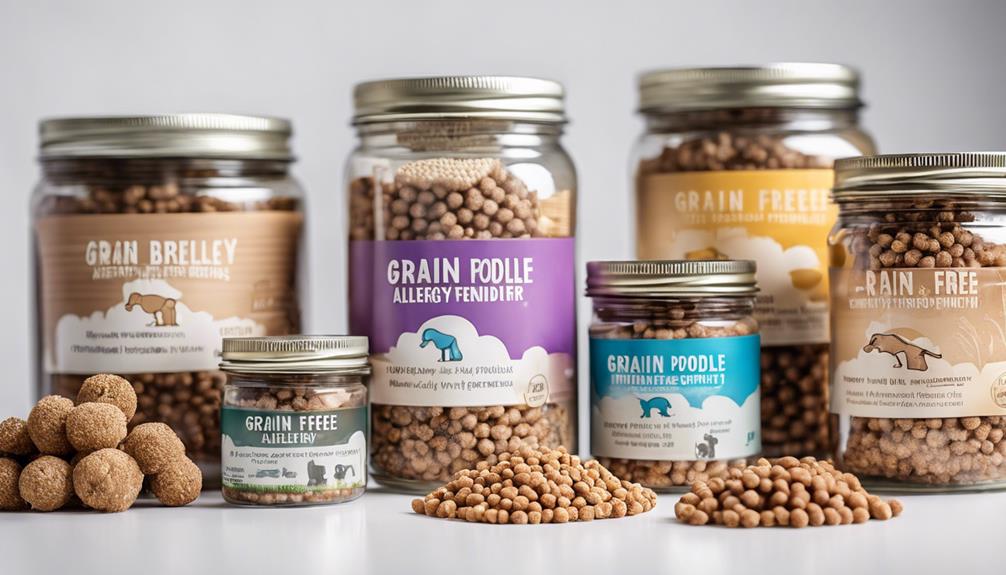
When selecting food for your Poodle with allergies, hypoallergenic diets can provide significant benefits. Opt for novel protein sources like duck, venison, or rabbit to minimize the risk of reactions. Additionally, consider grain-free options to cater to sensitivities towards common allergens such as wheat or corn.
Hypoallergenic Diet Benefits
To reduce the risk of triggering food allergies and sensitivities in your Poodle, consider incorporating a hypoallergenic diet specifically formulated to support their unique dietary needs. When choosing allergy-friendly food options for your furry companion, remember the benefits of hypoallergenic diets:
- Hypoallergenic diets are formulated to reduce the risk of food sensitivities in Poodles.
- These diets utilize novel protein sources like venison, duck, or kangaroo to minimize allergic reactions.
- Limited ingredient hypoallergenic diets exclude common allergens such as beef, poultry, soy, and dairy.
- Hydrolyzed protein diets break down proteins into smaller components, reducing the likelihood of immune responses in Poodles with food allergies.
Opting for high-quality hypoallergenic dog foods can help manage food allergies in Poodles and promote better digestive health.
Novel Protein Sources
Exploring novel protein sources for your Poodle's diet can significantly reduce the risk of triggering food allergies and sensitivities. Novel proteins like venison, rabbit, duck, or kangaroo are less likely to cause allergic reactions in Poodles due to their limited exposure in commercial dog foods. These unique protein options help identify and manage food allergies by offering alternative nutrient sources without common allergens. By introducing novel protein sources, you can effectively diagnose and treat food sensitivities and allergies in your Poodle. Rotating these novel protein sources can prevent sensitization and enhance the overall health of Poodles with food allergies.
| Novel Protein Sources | Benefits |
|---|---|
| Venison | High in protein and B vitamins |
| Rabbit | Low in fat and rich in nutrients |
| Duck | Rich in iron and amino acids |
| Kangaroo | Low in saturated fats and high in zinc |
Grain-Free Options
Considering the prevalence of food allergies and sensitivities in Poodles, exploring grain-free options proves crucial for managing their dietary needs effectively.
- Grain-free options for Poodles can help address food allergies and sensitivities linked to grains like wheat, corn, and soy.
- Many grain-free dog foods use alternative carbohydrate sources like sweet potatoes, peas, and lentils to provide energy and nutrients.
- Grain-free diets may contain higher levels of protein from sources like chicken, fish, or lamb, which can be beneficial for Poodles with food sensitivities.
- Some grain-free dog foods are formulated with novel proteins like venison, duck, or salmon to reduce the risk of triggering allergic reactions in Poodles.
When considering grain-free options, ensure to consult with a vet to guarantee your Poodle's nutritional requirements are met while managing their food allergies and sensitivities.
Lifestyle Changes for Poodle Allergies

How can lifestyle changes effectively manage food allergies in Poodles? Lifestyle modifications are pivotal in alleviating Poodle food allergies. Implementing a hypoallergenic diet tailored to your Poodle's specific needs is crucial. This diet should exclude common allergens like grains and certain proteins that may trigger allergic reactions. Additionally, environmental control measures play a significant role in managing allergies. Minimizing exposure to potential allergens such as pollen and dust mites can help reduce allergic reactions in your Poodle.
Regular monitoring for symptoms like excessive itching, red sores, and digestive issues is essential. Tracking these symptoms can provide insights into the effectiveness of the lifestyle changes being implemented. It is also recommended to consult with a veterinarian for guidance on making dietary changes and considering supplements that can support your Poodle's overall health while managing food allergies. By combining a hypoallergenic diet with environmental control measures and proper monitoring, you can help your Poodle lead a more comfortable and allergy-free life.
Medication for Poodle Food Sensitivities
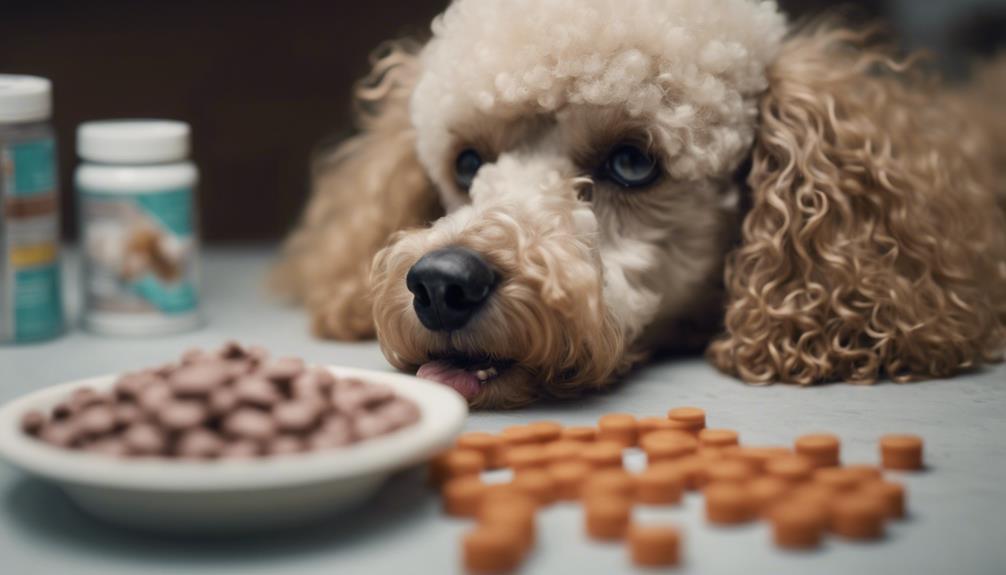
Medications commonly prescribed for Poodle food sensitivities include antihistamines to manage symptoms such as itching and skin irritation. When dealing with your Poodle's food sensitivities, it's essential to understand the medication options available to help alleviate their discomfort. Here are some key points to consider:
- Antihistamines: These can help relieve itching and skin irritation caused by food sensitivities in Poodles.
- Corticosteroids: Prescribed to reduce inflammation and discomfort in Poodles experiencing food sensitivities.
- Antibiotics: Sometimes necessary to treat bacterial infections that may arise due to food sensitivities in Poodles.
- Symptomatic relief medications: Aid in improving the quality of life for Poodles with food sensitivities by managing their symptoms effectively.
Understanding these medication options and working closely with your veterinarian can help ensure your Poodle receives the appropriate treatment for their food sensitivities, leading to a happier and healthier life.
Poodle Allergy Symptom Relief

To alleviate symptoms of food allergies in Poodles, implementing a comprehensive approach that includes antihistamines, medicated baths, dietary adjustments, flea control, and supplements is crucial for effective relief. Antihistamines play a vital role in managing itching and skin irritation in Poodles with food allergies. These medications help block histamine release, reducing the allergic response and providing relief. Medicated baths can also be beneficial, soothing skin problems and alleviating discomfort associated with food sensitivities in Poodles.
Dietary changes are key to managing food allergies in Poodles. Switching to hypoallergenic food formulas can significantly decrease allergic reactions, offering relief from symptoms. It is important to maintain regular flea control measures to prevent flea allergies, which can worsen food allergy symptoms in Poodles. Additionally, incorporating supplements like omega-3 fatty acids can support skin health and decrease inflammation linked to food sensitivities, further aiding in symptom relief for your furry companion.
Preventing Food Reactions in Poodles

Consistently monitoring and avoiding exposure to potential allergens is crucial for preventing food reactions in Poodles. To help you safeguard your Poodle from food allergies, consider the following tips:
- Identify Common Allergens: Be aware of common food allergens such as beef, poultry, lamb, fish, dairy, and soy that can trigger reactions in Poodles.
- Watch for Environmental Allergies: Keep an eye out for environmental allergens like pollen, mold, and dust mites, which can also lead to allergic reactions in your Poodle.
- Limit Direct Contact Allergens: Reduce exposure to substances like certain carpeting materials and grooming products that may cause skin issues in Poodles.
- Maintain Consistent Diet and Products: Stick to a consistent diet and opt for hypoallergenic grooming products to minimize the risk of food allergies and sensitivities in your Poodle.
Long-Term Care for Poodle Allergies

To sustain the well-being of your Poodle amidst allergies in the long term, continuous vigilance in monitoring and managing potential allergens is paramount. Implementing dietary changes tailored to your Poodle's specific food allergies can significantly alleviate symptoms and improve their overall quality of life. Alongside dietary adjustments, supplements rich in omega-3 fatty acids or probiotics may aid in managing Poodle food sensitivities over an extended period. Regular medicated baths can help soothe irritated skin, while antihistamines may be prescribed for more severe allergic reactions. Environmental control measures, such as ensuring a clean living environment and reducing exposure to known allergens, are fundamental for long-term allergy management in Poodles. Consistent flea control is crucial for preventing allergic reactions in Poodles with flea allergies. By integrating these strategies into your Poodle's long-term care plan, you can effectively support their health and well-being despite facing food allergies.
| Long-Term Care Strategies | Description | Benefits |
|---|---|---|
| Dietary Changes | Tailored to specific food allergies | Alleviates symptoms, improves quality of life |
| Supplements | Omega-3 fatty acids, probiotics | Aids in managing food sensitivities |
| Medication | Medicated baths, antihistamines | Soothes skin, treats severe allergic reactions |
| Environmental Control | Clean living environment, allergen reduction | Crucial for long-term allergy management |
Monitoring Poodle Food Sensitivities

When monitoring Poodle food sensitivities, observe for symptoms such as tender or painful abdomens, intermittent vomiting, regurgitation of uneaten food, and diarrhea to detect potential sensitivities effectively.
- Detailed Observation: Keep a keen eye on your Poodle for any signs of discomfort or abnormal behavior after meals.
- Food Diary: Maintain a food diary to track what your Poodle eats and note any reactions or symptoms that follow.
- Consultation with Veterinarian: Seek guidance from a professional to create a monitoring plan tailored to your Poodle's specific needs.
- Regular Check-ins: Make it a habit to regularly check in on your Poodle's well-being and diet to catch any sensitivities early on.
Support Resources for Poodle Allergies
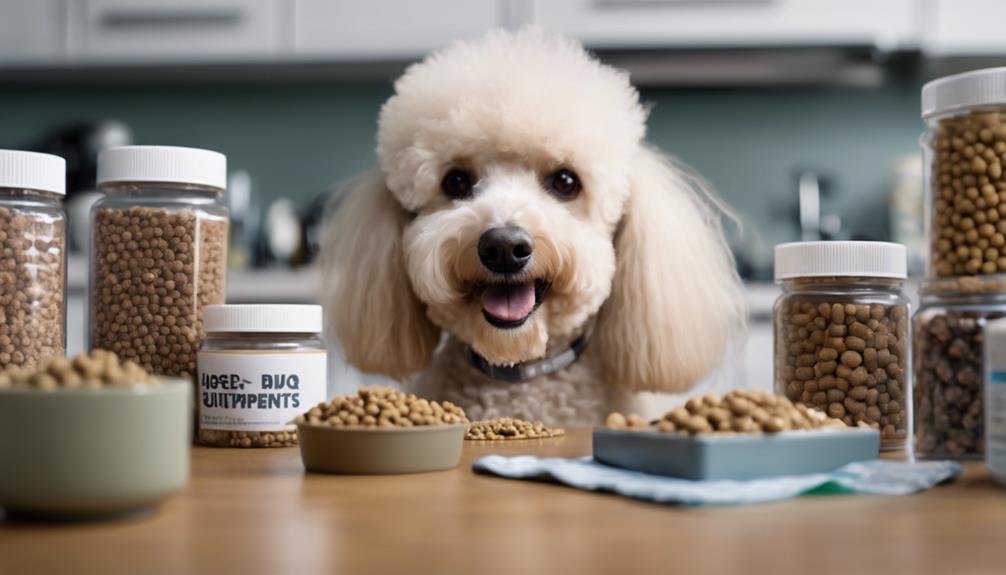
To effectively manage and support Poodle allergies, exploring various resources geared towards alleviating their symptoms and improving their overall well-being is essential. When dealing with environmental allergies in Poodles, allergen-specific immunotherapy (ASIT) can play a crucial role in desensitizing them to specific allergens. Additionally, regular grooming and bathing practices can help reduce environmental allergens that may accumulate on a Poodle's skin and coat. Omega-3 fatty acid supplements are known to support skin health in Poodles with allergies, contributing to overall symptom management. For severe allergies, seeking consultation with a veterinary dermatologist can provide specialized care and tailored treatment options that address the individual needs of the Poodle.
| Resource | Description | Benefits |
|---|---|---|
| Allergen-specific Immunotherapy (ASIT) | Desensitizes Poodles to specific allergens, managing environmental allergies. | Targets the root cause of allergies for long-term relief. |
| Regular Grooming and Bathing Practices | Reduces environmental allergens on a Poodle's skin and coat, alleviating allergy symptoms. | Improves skin health and overall well-being of the Poodle. |
| Omega-3 Fatty Acid Supplements | Supports skin health in Poodles with allergies, aiding in symptom management. | Reduces inflammation and promotes a healthy skin barrier. |
| Veterinary Dermatologist Consultation | Provides specialized care and treatment options for Poodles with severe allergies. | Tailored approach to address individual allergy triggers and symptoms. |
Frequently Asked Questions
What Foods Are Poodles Most Allergic To?
You should know that Poodles are most allergic to common allergens like beef, poultry, lamb, fish, dairy, soy, wheat, corn, and additives. Identifying these triggers through an elimination diet is essential for managing Poodle sensitivities and food intolerance.
How Do I Know if My Dogs Food Is Causing Allergies?
If your dog's food is causing allergies, you may notice symptoms like skin reactions, vomiting, or diarrhea. Consider food elimination or allergy testing. Consult a vet for dietary changes or hypoallergenic options.
Is My Dog Allergic to Food or Sensitive?
If you suspect your dog is allergic to food or sensitive, observe symptoms like vomiting or itching. Consider an elimination diet to identify triggers. Allergy testing can provide definitive results, while sensitivities may cause mild reactions.
How Do You Figure Out What My Dog Is Allergic To?
To figure out what your dog is allergic to, start with an elimination diet. Consult a vet for allergy testing and track symptoms. Gradually reintroduce ingredients to pinpoint triggers. Look for skin reactions and digestive issues.
Conclusion
In conclusion, you now have a deeper understanding of Poodle food allergies and sensitivities. Remember, despite their elegant appearance, Poodles can be quite sensitive to certain food allergens. So, be sure to carefully monitor their diet and work closely with your veterinarian to ensure they stay healthy and happy. After all, a Poodle's refined demeanor should not be compromised by a rumbling tummy or itchy skin. Stay vigilant and keep your Poodle thriving!
